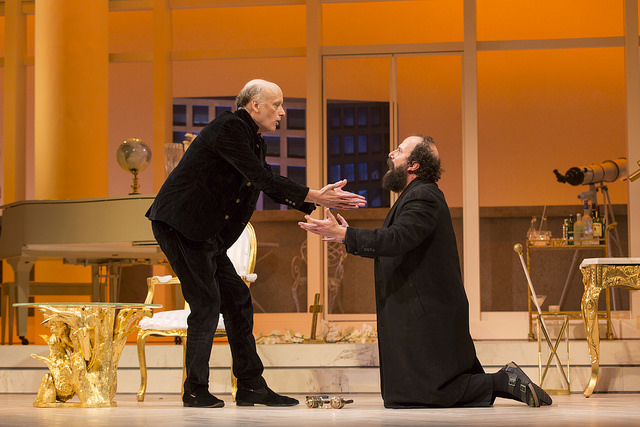 |
| The Cast of "Tartuffe" (photo: T. Charles Erickson) |
Cunning old scoundrel, deplorable cad, one sees him pious though most see him bad;
Today he'd be viewed as a jester or goof; for more than
three centuries, known as Tartuffe.
(Craib)
Huntington Theatre Company takes on the challenge of
Moliere's seventeenth century farce, generally considered one of the
world's best plays. Since its satirical targets are feigned
religious piety and hypocrisy, (perhaps as a result of the
playwright's early Jesuit schooling), it's had, and continues to
boast, quite a long shelf life. First presented in a briefer version
in 1664, originally in rhyming alexandrine verse (twelve syllables
per line), it was subsequently suppressed by Louis XIV for a period
of five years. Huntington's current version is translated by Ranjit
Bolt, in octameter verse (eight syllables per line), here directed by
the company's Artistic Director Peter DuBois. While Bolt is no
Hammerstein or Sondheim, his text manages by and large to succeed,
with a few missteps that don't really rhyme (“been”/”mean”)
and a lot that are way too predictable. Still it's a gutsy challenge
he undertakes, and most of the cast carry it off, though it can be
taxing to comprehend (think two hours of listening to the cadence of
Frost's “whose woods these are I think I know”, and you'll get
the idea). Opening night jitters seemed to cause several members of
the cast (some with estimable past acting credits) to deliver their
lines much too rapidly, or swallow their punch lines, but this should
work itself out as they grow more familiar with the demands of the
play. That said, anyone expecting subtlety from French farce may
miss the point; what one may rightly expect is that doors (and rather
massive ones in this case) will be slammed, and scenery will be
chewed (intentionally). When directed and played as broadly as in
this production, one's reaction will depend greatly on personal taste
for that sort of approach. For centuries, this work has survived and
flourished.
Tartuffe (Brett Gelman) is a faux zealot and
religious hypocrite, a fact that is obvious to virtually everyone
except a gentleman named Orgon (Frank Wood), his sole credulous
follower in the play. Tartuffe oozes his way into Orgon's household
intending to marry his daughter Mariane (Sarah Oakes Muirhead),
seduce his second wife, Elmire (Melissa Miller) and run off with the
family fortune. Recognizing his true colors are Orgon's son Damis
(Matthew Bretschneider), his Maid Dorine (Jane Pfitsch), his
brother-in-law Cleante (Matthew J. Harris), his mother Madame
Pernelle (Paula Plum), his mother's maid Flipote (Katie Elinoff) and Valere (Gabriel Brown), who is engaged to Mariane.
The other characters are Tartuffe's acolyte Laurent (Steven
Barkhimer), Monsieur Loyal, a bailiff (Barkhimer again) and an
official of the Court (Omar Robinson).
 |
| Frank Wood & Brett Gelman in "Tartuffe" (photo: T. Charles Erickson) |
In the wrong hands, farce can overplay the aspects of slapstick inherent in this type of work and forget that its purposes are “to correct the faults of men” (Moliere) and “escape through anarchy into a surreal world; joy in verse is the contrast between the discipline of the form and the ludicrous nature of what's being described” (Bolt). It's a dual challenge when one factors in speaking in rhyming couplets. Let it be said that the miracle of this production is that it spans and even connects the dots of a few centuries of satire. Though the play reeks with timeless (and timely) references, it's fundamentally its immediacy that transports (and transforms). Save for the obligatory homage to the use of meter, this could have been written yesterday (or tomorrow). This is in large part due to the content supplied by Bolt and the form as helmed by DuBois, not to mention the assembled cast of caricatures, especially Gelman in the title role, looking and acting like a cross between Rasputin and Tevye. Since this is live (and lively) ensemble theater, the contributions of the creative team are more crucial than ever, from the clever Scenic Design by Alexander Dodge to the varied Costume Design by Anita Yavich to the effective Lighting Design by Christopher Akerlind and Sound Design by Ben Emerson. Add in the (unexpected) Choreography by Daniel Pelzig and Original Music by Peter Golub and you have quite a pre-holiday package of delights for lovers of the visual and the verbal even when they are totally lacking in nuance.
At a running time of two hours with one intermission,
this remains a roller coaster of a trip. And one might ask the
obvious question: are there echoes of Tartuffe today? (When was the
last time we heard disingenuous reference to “our thoughts and
prayers” as a piteously pseudo-pious official response to the
latest tragedy, and how easily such insincerity comes tripping off
administrative tongues?). Make no mistake about it, if you like this
style of comedy, this is as good as it gets.
May the farce be with you, through December 10th.
No comments:
Post a Comment